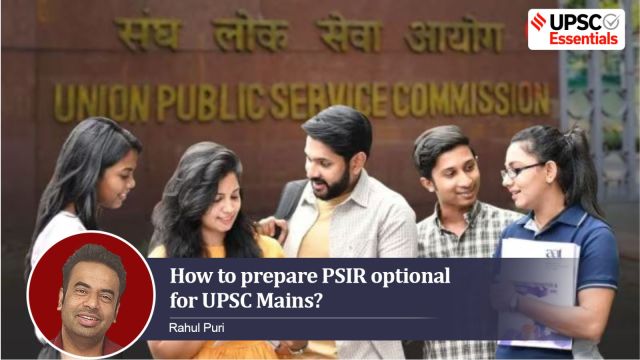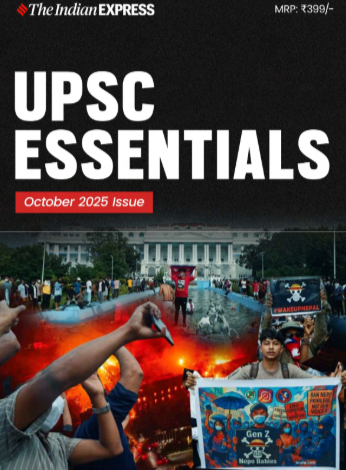Manas Srivastava leads the UPSC Essentials section of The Indian Express (digital). He majorly writes on UPSC, other competitive exams and education-related projects. In the past, Manas has represented India at the G-20 Youth Summit in Mexico. He is a former member of the Youth Council, GOI. A two-time topper/gold medallist in History (both in graduation and post-graduation) from Delhi University, he has mentored and taught UPSC aspirants for more than five years. His diverse role in The Indian Express consists of writing, editing, anchoring/ hosting, interviewing experts, and curating and simplifying news for the benefit of students. He hosts the YouTube talk show called ‘Art and Culture with Devdutt Pattanaik’ and a LIVE series on Instagram and YouTube called ‘LIVE with Manas’.His talks on ‘How to read a newspaper’ focus on newspaper reading as an essential habit for students. His articles and videos aim at finding solutions to the general queries of students and hence he believes in being students' editor, preparing them not just for any exam but helping them to become informed citizens. This is where he makes his teaching profession meet journalism. He is also the editor of UPSC Essentials' monthly magazine for the aspirants. He is a recipient of the Dip Chand Memorial Award, the Lala Ram Mohan Prize and Prof. Papiya Ghosh Memorial Prize for academic excellence. He was also awarded the University’s Post-Graduate Scholarship for pursuing M.A. in History where he chose to specialise in Ancient India due to his keen interest in Archaeology. He has also successfully completed a Certificate course on Women’s Studies by the Women’s Studies Development Centre, DU. As a part of N.S.S in the past, Manas has worked with national and international organisations and has shown keen interest and active participation in Social Service. He has led and been a part of projects involving areas such as gender sensitisation, persons with disability, helping slum dwellers, environment, adopting our heritage programme. He has also presented a case study on ‘Psychological stress among students’ at ICSQCC- Sri Lanka. As a compere for seminars and other events he likes to keep his orating hobby alive. His interests also lie in International Relations, Governance, Social issues, Essays and poetry. ... Read More
UPSC Essentials Mains Special | Expert Talk: How to prepare Political Science and International Relations (PSIR) optional?
UPSC Essentials starts a special series on optional subjects. We begin with Political Science and International Relations. Rahul Puri, PSIR expert, guides on how to approach the paper. Let's learn.
 "PSIR is both a dynamic and theoretical subject, providing a deep understanding of political systems and normative political theories", says Rahul Puri.
"PSIR is both a dynamic and theoretical subject, providing a deep understanding of political systems and normative political theories", says Rahul Puri. As the UPSC Prelims results were declared on July 1, the Mains season has begun and so have aspirants’ queries about their Optional subjects. At this important juncture of your examination cycle, UPSC Essentials of The Indian Express is commencing a special series on how to approach optional subjects for UPSC. In this series, subject experts will answer queries on optional subjects that we have received from our readers, aspirants, and subscribers in UPSC LIVE with Manas (IE’s UPSC video series) and on other platforms of Indian Express’ UPSC section.
We begin our series with Political Science and International Relations (PSIR) optional. One of the most popular optional subjects among aspirants has also seen good results in the past years. However, the queries of aspirants, especially freshers, range from general to specific areas of the paper.
Manas Srivastava in conversation with Rahul Puri, PSIR expert, takes up some of these questions. Let’s learn some important aspects of this optional and strategies accordingly.
About our expert: Rahul Puri has been teaching and mentoring UPSC aspirants for many years. His command over PSIR and his ability to simplify complicated topics have helped many candidates develop a good understanding of PSIR optional. Aspirants have benefitted from his important insights and strategies to tackle PSIR optional.
Manas: What should be the rationale behind choosing any optional subject and PSIR in particular?
Rahul Puri: You can think of selecting an optional subject as choosing a life partner, where personal interest and compatibility are paramount. Just as a successful marriage relies on genuine affection and mutual understanding, selecting an optional subject should be based on your passion and strengths. A genuine interest will keep you motivated and engaged throughout your preparation journey. While having a prior background in the subject is not mandatory, familiarity with the basics can ease the learning curve and enhance your understanding. At the same time, aspirants should be aware of the time and effort needed to prepare and revise the subject. Some subjects are more time consuming and require extensive reading, while others might be more straightforward.
If you are someone who has always been fascinated by international relations, global geopolitics, and the dynamics of political events, then opting for Political Science and International Relations (PSIR) as your optional subject in the UPSC Civil Services exam could be a strategic and fulfilling choice.
Manas: What are the pros and cons of PSIR paper as a UPSC optional subject?
Rahul Puri: PSIR is both a dynamic and theoretical subject, providing a deep understanding of political systems and normative political theories. The International Relations component offers insights into global issues and international politics, broadening your worldview. One of the key advantages of choosing PSIR as an optional subject is its significant overlap with the General Studies papers.
GS Paper II, which focuses on polity and governance, is essentially an extension of what is studied in PSIR. The Indian Government and Politics section covers many topics relevant to Indian Society. In GS Paper I, the Modern Indian History section on the National Movement aligns well with the National Movement topics in PSIR, where we delve into both the historical and theoretical aspects. Additionally, GS Paper III includes sections on security issues and areas of the economy that touch on political economy, further highlighting the relevance of PSIR in these areas. Apart from this, its concepts are useful for Ethics and Essay papers where quotes from famous political philosophers (Marx, Kant, Hobbes, Mill) have been regularly tested.
While it is challenging to pinpoint cons, one might argue that being dynamic in nature it requires substantial current affairs updates. Aspirants can brush up on their current affairs through PSIR specific Current affairs magazines. Also, the subjective nature of evaluating political theories and international relations can sometimes lead to varying interpretations and marks.
Manas: How to start with PSIR optional preparation for UPSC Mains?
Rahul Puri: As you prepare for the UPSC examination, it is essential to remember that our focus is on mastering the optional subjects to clear the exam, not pursuing a PhD. Keep your emotions in check and maintain a clear, objective focus on achieving results.
The starting point for every aspirant is the same — the syllabus provided in the official notification. Begin by thoroughly understanding the syllabus. This will help you develop curiosity and a structured approach to the topics. Completing these books will be a good starting point but it has to be combined with notes making as it is impossible to revise these lengthy books multiple times. Students may find the dictations that I and other teachers do in the class very helpful for the students.
Paper 1 Part A – Political Thought, Ideologies, Indian and Western Political Thought: This section is entirely static and highly rewarding if prepared well, despite being time-consuming. To build a strong foundation you can rely on books like O.P. Gauba for Political Thought and Theories, Brian Nelson for Western Political Thought, and V.R. Mehta along with IGNOU materials for Indian Political Thought.
Paper 1 Part B – Indian National Movement, Indian Government and Politics: This section is highly scoring and overlaps significantly with the GS syllabus. However, the writing style for optional papers differs from GS answers. Utilize good old Laxmikanth for Polity basics, Bipin Chandra and Spectrum for the Indian National Movement, and selectively refer to Indian Politics by Oxford publications.
Paper 2 Part A – Comparative Politics: This tricky section often involves current affairs-based questions despite its static nature. To begin with, you can use IGNOU MA modules and Andrew Heywood’s Global Politics for in-depth conceptual understanding, supplementing them with selective internet research.
https://www.youtube.com/watch?v=dGOLZAP9m9M?si=v74nknuVs6l0jZ56&w=560&h=315
Paper 2 Part B – International Relations: Dominated by current affairs, this section requires a blend of foundational knowledge and current event analysis. Rajiv Sikri’s “Challenges and Strategies” and David Malone’s “Does the Elephant Dance?” provide historical context, while ongoing updates from the internet ensure relevance. Understanding both the historical background and current dynamics of topics like India-Russia relations is crucial for scoring well.
Manas: After analysing UPSC past years’ questions (PYQs), what according to you has been the trend in marks and questions in PSIR optional?
Rahul Puri: Analysing past years’ questions and trends in the PSIR optional for the UPSC Civil Services exam reveals several key observations.
On PYQs
1. Certain topics, especially in Paper 1 (such as Political Theories and Indian and Western Political Thought), frequently recur with slight variations. Familiar themes include Marxism, Liberalism and influential political thinkers like Plato, Aristotle, and Machiavelli.
2. The Indian Government and Politics section also covers predictable areas like the Indian Constitution, federalism, and the roles of state organs.
3. In Paper 2, International Relations questions are heavily influenced by current global and regional developments, requiring candidates to integrate recent issues like Indo-China and Indo-US relations.
4. Comparative Politics questions often demand a blend of theoretical understanding and current affairs knowledge, emphasizing the need for conceptual clarity and application.
On Scoring trends
1. Scoring trends indicate that candidates who thoroughly understand fundamental concepts and effectively incorporate current affairs into their answers tend to achieve consistently high marks.
2. Static sections like Political Thought and Ideologies in Paper 1 often yield higher scores due to their predictable nature.
3. In contrast, marks in Paper 2 can vary significantly based on the candidate’s ability to stay updated with recent developments and analyse them critically.
4. Effective answer writing is crucial for high scores; structured answers with clear introductions, detailed discussions, relevant criticisms, and concise conclusions are rewarded.
5. Additionally, referencing scholars and relevant theories enhances the quality of answers, leading to better marks.
Manas: What are some tips for writing a ‘good’ answer in PSIR?
Rahul Puri: Effective answer writing is crucial and requires deliberate effort. In our optional paper, it’s advisable to write in paragraphs rather than points. Incorporate relevant quotes from scholars in every answer to strengthen your arguments. Start by defining the basic terms in PSIR wherever possible.
Follow the dictum of 3Ds — Define, Discuss, and Draw conclusions. After answering each question, check if you have included these elements. This approach will help you secure higher marks. Also, do not forget to include criticisms where applicable, as they are extremely important.
Story continues below this ad
For questions requiring differentiation between two concepts, such as social movements (new and old), present the comparisons in parallel. Do not separate your answer into different paragraphs for each concept. Instead, write about both concepts together for each point of differentiation. Always pay attention to temporal terms in the question (such as old, new, contemporary, etc.), as they will help you understand the examiner’s expectations and respond accordingly.
Previous year questions (PYQs) are extremely important for the optional papers, even if they are less critical for the Mains. After completing a topic, review and solve its PYQs. Time yourself to ensure you can reach the word limit within the given time frame. Consistent writing practice is the key to success in the optional subjects. I personally wrote answers to most of the questions asked in previous years, which significantly aided my preparation.
In an ideal situation, an aspirant should start answer writing after they develop a good command over the topics. Practice is crucial for improvement but in my experience, the most crucial aspect of answer writing practice is evaluation and review by a knowledgeable individual. So I guess even if one can prepare the subject on their own, enrolling in a test series is a must to receive regular feedback and enhance your answer-writing skills.
UPSC Essentials’ Subscribers/Readers Questions:
(a) Preparation Time for PSIR Optional:
The time required varies based on individual aptitude and background, but a general estimate is 6-8 months of dedicated study.
(b) Essential Reading Sources:
Key books include Andrew Heywood’s works, IGNOU material DD Basu’s books. You can also take guidance from coaching materials on PSIR optional. For current affairs, you can rely on magazines covering PSIR topics. (Refer question on analysis above)
(c) Revision Strategies:
Revise by practicing previous years’ questions (PYQs) in an intro-body-conclusion format. This method helps consolidate knowledge and improves answer-writing skills.
(d) Approaching the Political Theory Section:
Cover the static portion thoroughly as it is easier to grasp. Focus on understanding the thinkers, their works, and the implications of their ideas. Regular revision and answer writing are key.
(e) Dynamic Portions and Contemporary Issues in PSIR:
Review the syllabus to identify topics with contemporary relevance. Most political science topics have practical applications in daily politics and current affairs, which should be integrated into your preparation.
Manas: What is your advice for The Indian Express’ UPSC Essentials aspirants who will take up PSIR as their optional subject in the Mains exam?
Rahul Puri: Three important pieces of advice I would like to give to your readers who aspire for Civil Services are:
1) Stay curious and inquisitive: Develop a genuine interest in the subject matter. Curiosity will drive you to explore topics deeply and understand them better.
2) Consistent practice and revision: Regular study, practice, and revision are essential. Focus on understanding concepts rather than rote learning.
3) Seek guidance: Don’t hesitate to seek help from mentors, teachers, or fellow aspirants. Engaging in discussions can provide new perspectives and clarify doubts.
P.S: This is not the end of PSIR Optional special article. You may still send questions on PSIR optional in general or any topic in particular. We will take up as a rejoinder article on PSIR. Write to me on manas.srivastava@indianexpress.com
Subscribe to our UPSC newsletter and stay updated with the news cues from the past week.
The UPSC articles of Indian Express is now on Telegram. Join our Telegram channel- Indian Express UPSC Hub and stay updated with the latest Updates.
For your answers, queries and suggestions write at manas.srivastava@indianexpress.com.
UPSC Magazine

Read UPSC Magazine



- 01
- 02
- 03
- 04
- 05





























